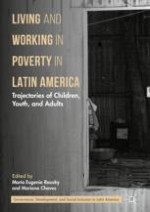2019 | OriginalPaper | Buchkapitel
4. Working Lives of Youth in Poverty in Urban Argentina
verfasst von : Gonzalo Assusa, Mariana Chaves
Erschienen in: Living and Working in Poverty in Latin America
Aktivieren Sie unsere intelligente Suche, um passende Fachinhalte oder Patente zu finden.
Wählen Sie Textabschnitte aus um mit Künstlicher Intelligenz passenden Patente zu finden. powered by
Markieren Sie Textabschnitte, um KI-gestützt weitere passende Inhalte zu finden. powered by
